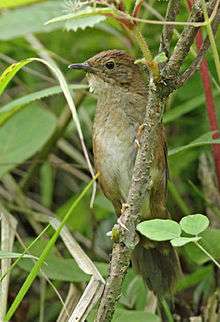Sichuan bush warbler
The Sichuan bush warbler (Locustella chengi) lives primarily in the thick brush and on tea plantations in five mountainous provinces of central China. It is a relatively small bird with a weight of 10 grams and an average length of 13 cm. Unlike its congener the russet bush warbler, which is found in the same mountains and also in the Himalayas, Vietnam, the Philippines, and Indonesia, the Sichuan bush warbler prefers elevations below 7,500 feet.[2] The two species shared a common ancestor about 850,000 years ago. They are distinguished by plumage and sonogram terminology – their songs. Locustella chengi emits a long buzz, followed by a shorter click, often repeated in series, and the song is in a lower frequency than its genetic cousin.
| Sichuan bush warbler | |
|---|---|
 | |
| Scientific classification | |
| Kingdom: | Animalia |
| Phylum: | Chordata |
| Class: | Aves |
| Order: | Passeriformes |
| Family: | Locustellidae |
| Genus: | Locustella |
| Species: | L. chengi |
| Binomial name | |
| Locustella chengi Alström et al., 2015 | |
The name honors Cheng Tso-hsin (Zheng Zuoxin, 郑作新) (1906–1998), founder of the Peking Natural History Museum and a prominent Chinese ornithologist.[3][4]
References
- BirdLife International (2012). "Locustella chengi". IUCN Red List of Threatened Species. 2012. Retrieved 26 November 2013.CS1 maint: ref=harv (link)
- Alström, P.; Rasmussen, P.; Olsson, U.; et, al. (1 May 2015). "Integrative taxonomy of the Russet Bush Warbler Locustella mandelli complex reveals a new species from central China" (PDF). Avian Research. 9 (6): e912656. doi:10.1186/s40657-015-0016-z.
- "New bird in China dubbed Sichuan bush warbler". Science Codex. 1 May 2015. Archived from the original on 21 July 2015. Retrieved 1 May 2015.
- Alström, Per; Xia, Canwei; Rasmussen, Pamela C; Olsson, Urban; Dai, Bo; Zhao, Jian; Leader, Paul J; Carey, Geoff J; Dong, Lu; Cai, Tianlong; Holt, Paul I; Le Manh, Hung; Song, Gang; Liu, Yang; Zhang, Yanyun; Lei, Fumin (2015). "Integrative taxonomy of the Russet Bush Warbler Locustella mandelli complex reveals a new species from central China" (PDF). Avian Research. 6. doi:10.1186/s40657-015-0016-z.
